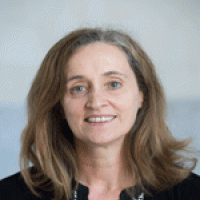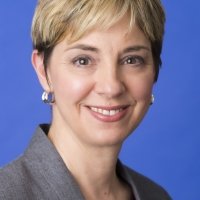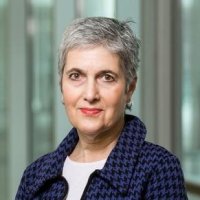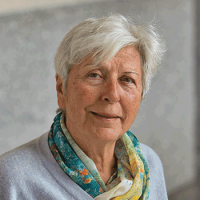Broken Borders, Broken States: One Hundred Years After Sykes-Picot
Keynote Address
On May 17, 2016 the Middle East Program at the Woodrow Wilson Center hosted the event “Broken Borders, Broken States: One Hundred Years After Sykes-Picot.” The keynote address was delivered by Elizabeth Thompson, Wilson Center Fellow and Professor of History at the University of Virginia.
Thompson began the event with an introduction to the historical meaning behind the Sykes-Picot Agreement. She told the audience that her presentation would provide a fresh perspective from archival research on the issue and give background to the borders drawn in May 1916 and authored by Mark Sykes and Francois Georges-Picot. She predicted that of the day’s panelists would discuss ISIS and the Iraq-Syria border. Thompson went on to argue that there is a more damaging border to focus on, one that continues to haunt international law: the “color line.”
This line, she explained, represented the process by which countries were selected to join the League of Nations, and essentially deemed these states either “white” or not “white enough.” During this selection process, Arabs, Thompson said, were judged as being on the “wrong” side of the color line, something that influenced Arab politics for the coming century. Arabs believed they belonged on the “right” (white) side, one that would have granted them freedom. Thompson explained that in discussing Sykes-Picot, one needs to delve deeper into the historical meaning and discuss the denial of human rights. She said that without returning to this moment and addressing this, we become heirs to those who perpetuated these crimes.
During the drawing of the color line, Thompson shared the history of Arabs traveling to Paris following Sykes-Picot to prove their “whiteness” and receive freedoms. Prince Faisal led the Arab delegation during the Paris Peace Conference and went on to organize the Syrian Arab General Congress, Thompson explained. She urged the audience to consider the historical ramifications of Sykes-Picot beyond today’s focus on ISIS.
Panel 1-The Impact of Sykes-Picot: Understanding the Current Turmoil in the Middle East
Three experts shared their analyses on the impact of Sykes-Picot on today’s Middle East.
The first panel of this event was comprised of speakers Geneive Abdo, Nonresident Senior Fellow at the Rafik Hariri Center for the Middle East at the Atlantic Council; Michele Dunne, Director and Senior Associate for the Middle East Program at the Carnegie Endowment for International Peace; and F. Gregory Gause, III, a Professor International Affairs and Head of the International Affairs Department at the Bush School of Government and Public Service at Texas A&M University. Henri J. Barkey, Director of the Middle East Program at the Wilson Center, moderated the panel.
Dunne began the panel by thanking Elizabeth Thompson for raising important issues and explained how Sykes-Picot has now been made relevant again for several reasons. First, ISIS has now brought Sykes-Picot into the forefront as the group has publicly declared its goals of reversing Sykes-Picot’s effects. Second, there has been a discussion on the decline of Western and U.S. influence in the region. Last, the post-World War II Arab state system is now under threat due to the aftermath of the 2011 uprisings. But Dunne expressed that though the influence of the West in the region is receding, this does not mean the act of the West privileging the rights of some over others or the carving up of the region is over. Regarding failure of the Arab state system, she said that the region’s growing youth bulge, in addition to the failure of internal governance, is driving instability.
Abdo focused her comments on religious minorities in the region. She agreed with Dunne that the decline of the state structure is certainly a factor influencing the crises, and given this, argued that religious identity is important now more than ever. While state identity has become less important, other aspects have become more significant. Abdo went on to discuss why religious conflict in the region (the Sunni-Shi’a divide) is due to two events: the 1979 Iranian Revolution (which created a radical Shi’ism) and the evolution of the Muslim Brotherhood in Egypt (which attempted to define Sunni-Shi’a Muslims). She stated that though we often debate about whether religion or politics/borders matter more, it is the intersection of both that influence events and regional issues. Abdo closed by saying that despite the decline of state structure, the threat of the state’s power still exists in the Arab world.
Gause opened with answering this question: Are we going to see a redrawing of lines and a total collapse of the states created by European entities? No, we will not, he predicted. He explained that the issue at hand is less about state borders and more about a decentralization of authority. We have not seen borders change, but instead the devolution of state authority to sub-state actors. Gause explained most people do not want to actually change the map of the Middle East, although the Kurds have some interest in this. The only actor in the region, he said, that has advocated for a wholescale redrawing of border lines has been the Islamic State, and they have no outside support; no one will recognize them as a legitimate, independent state. Instead of looking for a new map, Gause argued, the issue is that real de facto rule on the ground does not correspond to de jure border lines.
Barkey asked the panelists to consider to what extent the states’ inability to manage politics and the forces of globalization have exacerbated ethnic tensions and led to the collapse of order. Dunne expressed that most Arab countries are not participating much in a global exchange; the greater issue is these countries have low youth employment rates. Abdo said that Shi’a militant groups are an example of the tension Barkey laid out, citing Lebanon as an example. Gause agreed with Dunne that globalization has little to do with the issue, as those involved in the global economy, like Southeast Asia, are doing fine. He said that there is an interesting set of cases in the Middle East, as some are falling apart and some still have control. The crisis of the Middle East, Gause explained, is much more regional in origin than the product of globalization.
By Elena Scott-Kakures, Middle East Program
Panel 2-Beyond Sykes-Picot: The Prospect of Changing Borders in the Future
Three experts shared their anticipations and predictions for prospects in the Middle East beyond Sykes-Picot.
The second panel was comprised of speakers Ellen Laipson, a Distinguished Fellow and President Emeritus of the Stimson Center; Daniel Neep, a Wilson Center Fellow and an Assistant Professor at the School of Foreign Service at Georgetown University; and Marina Ottaway, a Middle East Fellow at the Wilson Center. Michael Van Dusen, Senior Advisor at the Wilson Center, moderated the panel.
Laipson began the conversation by asking if there is a better map for the Middle East, and if so, how would we get there? She agreed with Gause it is most likely that the current borders will remain, in part because it is not that easy to change geography. She went on to explain that current governments in the Middle East have deficits of autonomy, and states are also failing to deliver goods and services. But national identity still remains, she said, so it would be difficult to restructure Iraq and Syria. She added new borders also would not help given that the demography of the region is not static. Laipson argued for greater recognition that the world’s borders are becoming more porous and what happens inside the borders matters more than the borders themselves.
Neep also reflected on one of the questions at hand: How would we go about drawing a new map? This, he said, led him to ask several more questions: Who is drawing the borders? What problem is redrawing the borders addressing? And why are we event asking these questions? He said that these are not questions regarding external borders, given that Middle East borders are actually quite resilient. Neep went on to explain how the Islamic State is actually a peripheral movement, where the state is not strong, and this draws our attention to discuss the center vs. the periphery. Our focus should now be more on the internal state system, he said, as there has been greater crisis from state formation in the 1950s through the 1970s than Sykes-Picot. So, Neep explained, the issue is more to do with the nature of governance and internal management.
Ottaway continued on the vein of state governance. She stated that we are now facing a deep transformation in the nature of the state. She asserted that when we work to answer what happens next, we need to be careful not to assume that the West is going to have a determinant impact, as this has to come from inside the state. She shared examples of fragmented states, contrasting Lebanon with Somalia. While Lebanon is a fairly high functioning fragmented state (albeit not an ideal situation), Somalia’s situation is unacceptable. While we in the West, Ottaway explained, cannot put these states back together, the international community can encourage them to go the way of Lebanon over Somalia. Ottaway added that the way we work with non-state actors can also help generate change. The most important question to answer, she said, is how we can help the process along in the least destructive way.
Neep touched on the discussion of Lebanon as a model for dysfunctional states, arguing that this is dangerous. He added that there is not a one-size fits all perspective to state-building, and that supporting civil society actors doing great work on the ground is crucial. Van Dusen asked the panelists to comment on factors that could change dynamics in the Middle East: the Islamic State and state military and intelligence services, the last of which he argues the core of dysfunction. Neep asserted that he does not think ISIS is a revolutionary movement, Laipson added that its impact will depend on local conditions, and Ottaway predicted that ISIS will continue to lose territorial control over the next few years. All were in agreement that military and intelligence services are in need of reforms and are partially to blame for the regional crises.
By Elena Scott-Kakures, Middle East Program
Speakers

Professor of History, University of Virginia; Senior J.R. Fellow, U.S. Institute of Peace (2007-08)


Senior Fellow, Council on Foreign Relations


Former Senior Research Associate and Head of the Middle East Program, Carnegie Endowment for International Peace
Assistant Professor, Center for Contemporary Arab Studies, Georgetown University
Former Senior Advisor to the President for Alumni Relations, Woodrow Wilson Center; Former Executive Vice President and Chief Operating Officer, Woodrow Wilson Center
Hosted By

Middle East Program
The Wilson Center’s Middle East Program serves as a crucial resource for the policymaking community and beyond, providing analyses and research that helps inform US foreign policymaking, stimulates public debate, and expands knowledge about issues in the wider Middle East and North Africa (MENA) region. Read more
